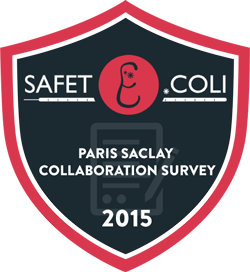Team:Cork Ireland/Collaborations


Trinity College Dublin & University College London
This year, Cork iGEM collaborated with both the Trinity College Dublin and the University College London iGEM teams. The Basehunter system was put together in an anonymous way so that the participating teams could not see what reagents were present or absent in order to avoid biased results. Cork iGEM put together tubes containing mastermixes and labelled them using unbiased characters such as A,B and C that were then sent via post. The participating iGEM teams agreed to test the systems and give feedback regarding the protocol. We were unfortunately unable to obtain test results from the UCL team due to time constraints. They did however successfully receive the kit. Mariola Sebastián gave us feedback regarding out Basehunter System,"I really liked that the tubes were labeled with numbers and letters. I think its great because you don't need to know what each one contains in order to follow the protocol, which makes it more accessible, and the simple labeling makes them easier to find and work with. In the final version of the kit. I think it would be great if you could add more of the needed things, like sterile plates and sterile LB Media, to speed and simplify the process".

The aim of this collaboration was to investigate if the Basehunter system could be both easily transported and explained with a protocol. A written protocol and a video protocol were prepared. The video protocol can be seen below and the written protocol can be seen here.
Trinity tested the system and these were the results obtained in the blind testing; Sent to the team were 6 tubes containing the HPV 55bp Detector. Tubes 1-3 were to be positive controls, while tubes 4-6 were to be negative. This was not disclosed to the experimenting team at TCD.

Feedback from the team was positive and they reported - “The Protocols were very clear indeed and easy to follow, and it helped greatly that there was an alternative to using the PCR machine when incubating the coloured tubes.”
These results proved that the detector could be posted to other labs and that the protocols were simply followed. In addition, results achieved were consistent with those obtained in our lab at UCC. See figures 1 and 2 for results reported by TCD.

Also, to assist TCD, we researched into the possibility of constructing a detector to detect artemisinin resistance in species of plasmodium falciparum, the parasite that causes malaria. TCD informed us that this is a significant problem in areas where malaria is endemic, as usually the most widely used treatment for malaria is artemisinin. Between the two teams, we found that the most common mutations that confer resistance are SNP’s on the Kelch 13 propellor (Haldar et al., 2015) . The mutations are point mutations, single base changes. Our detector was not sensitive or specific enough to pick up these small changes.

References:
Haldar, K. et. al, April 2015, “A molecular mechanism of artemisinin resistance in Plasmodium falciparum malaria”, Nature, 520, 683–687
Meetups
In July Cork iGEM, along with Trinity College Dublin (TCD) iGEM, organised a meetup that was posted on iGEM.org. Cork iGEM travelled to Dublin where we met up with TCD for the first time. TCD met us at the front gate with a very welcoming sign and brought us to a hang out space called the Global Room.

We provided feedback on their project work and told them what to expect at the Jamboree. We were in contact with the team during its early days before the team members were selected and stressed the need for a diverse team from many backgrounds. This was something we learned at iGEM in our previous year and knew it was important to relay this advice. We also suggested the team not focus entirely on lab work and engage with the community throughout their project.
Over the course of working on the projects, we kept in contact with the team and aided them in their efforts to create a Youtube Channel “iGEM Academy” with videos of common lab protocols by providing a video tutorial of our “Detector Reaction” for use with our BaseHunter parts.
We gave a presentation of our project and our results up to the beginning of July.




TCD brought us to their lab and talked us through their plans for the project over the summer months. They then kindly gave us a campus tour and brought us to see the beautiful Book of Kells and the Long Room. We had a social that evening!
In August this year we had the opportunity to meet up with members of the UCL iGEM Team at the IndieBio Demo Dinner & Summer Party. We also met up with them the following day at Forma labs. We spoke about our projects and planning for the Jamboree. We spoke about London Hackspace and the hacker community in London and the future of Cork's hacker community.
